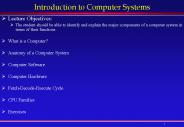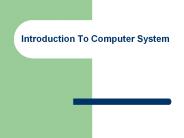Introduction to Computer Systems - PowerPoint PPT Presentation
Title:
Introduction to Computer Systems
Description:
Title: Introduction to Computer Systems Author: droh Last modified by: droh Created Date: 8/29/2006 4:26:32 PM Document presentation format: Overhead – PowerPoint PPT presentation
Number of Views:44
Avg rating:3.0/5.0
Title: Introduction to Computer Systems
1
Introduction to Computer Systems
15-213 The Class That Gives CMU Its Zip!
David R. OHallaron August 30, 2006
- Topics
- Staff, text, and policies
- Lecture topics and assignments
- Lab rationale and infrastructure
class01b.ppt
15-213 F 06
2
Teaching staff
- Instructors
- Prof. Randal E. Bryant
- Prof. David R. OHallaron
- TAs
- Ashwin Bharambe
- Michael Brotzman
- Tudor Dumitras
- Donnie Kim
- Amit Manjhi
- Course Admins
- Cindy Chemsak (NSH 4303)
- Barb Grandillo (WeH 8018)
Come talk to us anytime! (Or phone or send email)
3
Textbooks
- Randal E. Bryant and David R. OHallaron,
- Computer Systems A Programmers Perspective,
Prentice Hall 2003. - http//csapp.cs.cmu.edu
- Brian Kernighan and Dennis Ritchie,
- The C Programming Language, Second Edition,
Prentice Hall, 1988
4
Course Components
- Lectures
- Higher level concepts
- Recitations
- Applied concepts, important tools and skills for
labs, clarification of lectures, exam coverage - Labs
- The heart of the course
- 1 or 2 weeks
- Provide in-depth understanding of an aspect of
systems - Programming and measurement
5
Getting Help
- Class Web Page
- http//www.cs.cmu.edu/213
- Copies of lectures, assignments, exams, solutions
- Clarifications to assignments
- Message Board
- http//autolab.cs.cmu.edu
- Clarifications to assignments, general discussion
- The only board your instructors will be
monitoring (No blackboard or Andrew) - Personal help
- Professors
- R. Bryant, office hour or appt.
- D. OHallaron, office hour, appt, or when door is
open. - TAs office hour, email, or appt.
6
Policies Assignments
- Work groups
- You must work alone on all labs
- Handins
- Assignments due at 1159pm on Wed or Fri evening
- Electronic handins using Autolab (no
exceptions!). - Makeup exams and assignments
- OK, but must make PRIOR arrangements with Prof.
OHallaron. - Appealing grades
- Within 7 days of due date or exam date.
- Labs Talk to the lead person on the assignment
- Exams Talk to Prof OHallaron.
7
Cheating
- What is cheating?
- Sharing code either by copying, retyping,
looking at, or supplying a copy of a file. - Coaching helping your friend to write a lab,
line by line. - What is NOT cheating?
- Helping others use systems or tools.
- Helping others with high-level design issues.
- Helping others debug their code.
- Penalty for cheating
- Removal from course with failing grade.
- Detection of cheating
- We do check and our tools for doing this are much
better than you think!
8
Policies Grading
- Exams (40)
- Two in class exams (10 each)
- Final (20)
- All exams are open book / open notes.
- Labs (60)
- 7 labs (6-12 each)
- Grading Characteristics
- Lab scores tend to be high
- Serious handicap if you dont hand a lab in
- We offer generous redemption programs
- Tests typically have a wider range of scores
9
Facilities
- Labs will use the Intel Computer Systems Cluster
(aka the fish machines) - 15 Pentium Xeon servers donated by Intel for CS
213 - Dual 3.2 Ghz 64-bit (EM64T) Nocona Xeon
processors - 2 GB, 400 MHz DDR2 SDRAM memory
- Rack mounted in the 3rd floor Wean Hall machine
room. - Your accounts are ready.
- Getting help with the cluster machines
- See course Web page for login directions
- Please direct questions to your TAs first
10
Logging into Fish Machines
- Read description on the course web-page carefully
- Run checkin script (once only) to setup Kerberos
credentials - /afs/cs/academic/class/15213-f06/bin/checkin
- Login using your Andrew ID and password
- ssh x l bovik_at_ANDREW.CMU.EDU
tuna.ics.cs.cmu.edu - Keep your code in your 213hw directory on your
Andrew account
11
Programs and Data (6)
- Topics
- Bits operations, arithmetic, assembly language
programs, representation of C control and data
structures - Includes aspects of architecture and compilers
- Assignments
- L1 (datalab) Manipulating bits
- L2 (bomblab) Defusing a binary bomb
- L3 (buflab) Hacking a buffer bomb
12
Performance (2)
- Topics
- High level processor models, code optimization
(control and data), measuring time on a computer - Includes aspects of architecture, compilers, and
OS - Assignments
- L4 (perflab) Optimizing code performance
13
The Memory Hierarchy (2)
- Topics
- Memory technology, memory hierarchy, caches,
disks, locality - Includes aspects of architecture and OS.
- Assignments
- L4 (perflab) Optimizing code performance
14
Linking and Exceptional Control Flow (3)
- Topics
- Object files, static and dynamic linking,
libraries, loading - Hardware exceptions, processes, process control,
Unix signals, nonlocal jumps - Includes aspects of compilers, OS, and
architecture - Assignments
- L5 (tshlab) Writing your own shell with job
control
15
Virtual Memory (4)
- Topics
- Virtual memory, address translation, dynamic
storage allocation - Includes aspects of architecture and OS
- Assignments
- L6 (malloclab) Writing your own malloc package
16
I/O, Networking, and Concurrency (6)
- Topics
- High level and low-level I/O, network
programming, Internet services, Web servers - concurrency, concurrent server design, threads,
I/O multiplexing with select. - Includes aspects of networking, OS, and
architecture. - Assignments
- L7 (proxylab) Writing your own Web proxy
17
Lab Rationale
- Each lab should have a well-defined goal such as
solving a puzzle or winning a contest. - Doing a lab should result in new skills and
concepts - We try to use competition in a fun and healthy
way. - Set a reasonable threshhold for full credit.
- Post intermediate results (anonymized) on Web
page for glory!
18
Autolab Web Service
- Labs are provided by the Autolab system
- Autograding handin system developed in 2003 by
Dave OHallaron - Apache Web server Perl CGI programs
- Beta tested Fall 2003, very stable by now
- With Autolab you can use your Web browser to
- Review lab notes, clarifications
- Download the lab materials
- Stream autoresults to a class status Web page as
you work. - Handin your code for autograding by the Autolab
server. - View the complete history of your code handins,
autoresult submissions, autograding reports, and
instructor evaluations. - View the class status page
19
Good Luck!































